Japanese Language Committee
Purpose�F
The committee helps foreigners to learn Japanese language so that they can live more comfortably in Japan. We believe their Japanese life will be more valuable through studying the language, Japanese culture and customs.
There are 17 Japanese language classes and each class is developed and coordinated by 120 volunteers and features their own special creativity to assist learning the language.
Main activities�F
1) Opening Japanese language classes in many places in Ichikawa
Please check with the coordinator the place, time schedule and tuition before you join since they may be changed.
2) Arranging classes on how to teach the Japanese language
We periodically coordinate Japanese language teaching lectures.
3) Holding Japanese language training session
Japanese training sessions coached by professionals are held for the volunteer teachers several times a year These sessions are to improve quality and skills of teaching and they learn how to teach unique expressions in Japanese.
4) Support for the Survival Japanese Class
Survival Japanese is coordinated mainly by the Foreign Resident Committee with our full cooperation.
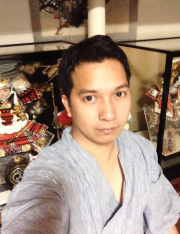
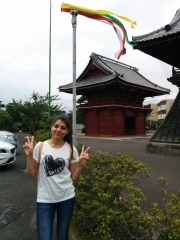
She said she has past the exam of JLPT grade 4 recently. She is dreaming of passing N1 in the future. She sang �gUE WO MUITE ARUKOU�h with beautiful soprano voice at the class�fs new year party and got great applause from the classmates.
[ footnote: What is JLPT? For the people who don�ft speak Japanese language as a mother tongue in Japan and elsewhere, JLPT conduct the exams for the purpose of measuring and accrediting in Japanese Language ability. This organization has administrated by International Exchange Fund and Japan International Education Assistance
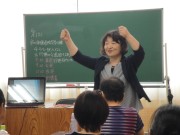
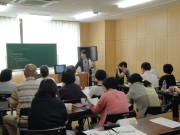
The following are the main points considered for this course : �@ The theme centers on how to use well the recent teaching materials. �ATo open one same course in Ichikawa and Gyotoku. �BTo invite the instructor from AJALT(Association for Japanese-Language Teaching) �C The course fee is free.
This course is well accepted and evaluated highly by the attendees.
�B
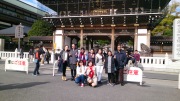
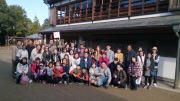
We tripped to Naritasan & Boso-no-mura with 41 foreigners and 4 stuffs by bus.
Fortunately, Naritasan was in full autumnal tints and chrysanthemum holding and we had valuable experience of a Goma Fire Ritual.
Boso-no-mura is a Chiba prefectural facility that reproduces a Japanese scenery of Edo era which were old samurai residences and farmhouses.
We enjoyed first-hand various types of Japanese traditional crafts such as Takeuma(stilts) and Koma(spinning top).
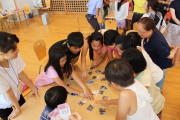
40 students were participated -- 32 elementary school ,8 junior high -- from 10 foreign countries, include China, Taiwan, Philippine and so forth. Some of those 13 students have been newly arrived in Japan and supposed to enter Japanese school. And they have joined after finishing the Japanese language supporting program for the preschoolers. This program has started last year and delegated to the Japanese Language Class Committee from the Municipal Board of Education.
The participants have studied a lot of things such as learning how to read Japanese calendar and clock, exploring the school facilities, making timetables etc. And they would have felt the atmosphere of Japans�f school life throughout those workouts prior to a school term begins.
On the curriculum in �gGet to know more about Ichikawa City�h, they checked where their homes and the schools were. Then, they played a game of sugoroku in which they looked around the great sights in the City, and spent recess time playing karuta ? Japanese card ? on which they could see many pictures of the beautiful Ichikawa�fs scenery.
On the 24, they made a field trip riding two buses. The first visit was the confectionery plant that produce kasutera ?sponge cake ? and they tried taste testing them. The next visit was The City�f s Western Part Disaster Prevention Center. They had already accustomed to disaster preventive knowledge and how to deal with in case of emergency, because they had learned about those issues at the classes held in the previous day. Their parents also pleased to have practice for disaster prevention with their children.
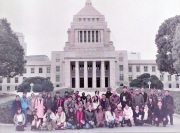
They took a walk to koukyo higashi gyoen, the Eastern Garden in the Palace, and took a photo on the back of nijyuu-bashi, a bridge entrance to the Palace. After having their B.Y.O lunch, they strolled through the parliament house. A line of the participants along the road stretched so long because of everyone�fs walking pace had been different, that made capable guides difficulty with bringing them together.
At the end, they had a valuable one-hour guided tour at the parliament�fs conference hall.
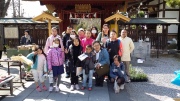
Most of the students are less than one year since coming to Japan, with nationalities ranging from Chinese, Philippine, Vietnamese, Indonesian, Peruvian, Guatemalan, Kyrgyz, Thai, to Nepali; 20 elementary school students and 5 junior highs.
Class�fs Objectives:
- Help kids adapt themselves to Japanese school life, provide place for relax and enjoy
- Help kids take pride in their (parent�fs) country and culture
- Support them in cooperation with their parents
- Help kids actively join the local community, and learn to live self-reliantly their own life
In this class we teach Japanese with emphases firstly on listing, secondly on speaking, and thirdly on writing abilities. We help students to build vocabulary necessary in school through enjoyable learning methods utilizing the real objects, picture cards, games, and songs.
At the end of every class periods we have students-parents parties/activities; international potlach Yukata party in July, gift exchange at the year-end party in December, completion ceremony and parents meeting in March. Also, we actively participate in local/IIA�fs activities such as �gSurvival Japanese Course�h and �gNew Year Festival�h.
In April new class period has started, new students have enrolled.
Volunteers who would like to help children learn Japanese are welcome. Those who have interests are encouraged to contact us.
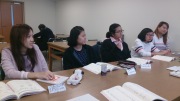
Programs consist of Japanese language lessons in the mornings and cultural activities in the afternoons; such as visits to Akihabara, Imperial Palace, Tokyo Disney Resort, and experiences of Calligraphy and Origami.
Although Thai students had different levels of Japanese language skill, they all enjoyed interactions with students at Showa Gakuin, actively participated in the program.
Two volunteer teachers at UNESCO Ichikawa School actively contributed to the Japanese language study programs from planning through implementation.
Interesting episodes we found in our communications with Thai students include; they named Ramen and curry rice as their favorite foods, and breads are called as Yamazaki in Bangkok.
It was truly enjoyable two weeks, and we believe that Thai students must have come to feel intimacy to Japan and become fans of Japan through this program.
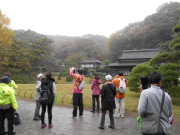
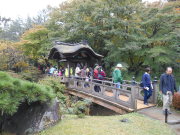
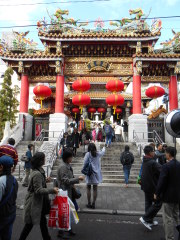
Bus Tour for Sankei-en and China town in Yokohama�@
We tripped to Yokohama area with 38 foreigners and 9 volunteers by bus though it
was raining on November 15, 2015. It, however, cleared sky when we arrived at
Sankei-en and enjoyed seeing the huge beautiful Japanese garden and historical
architectures collected from Kyoto and Kamakura. We then went to China Town
where the food festival was held and so crowded. After enjoying shopping and
eating, we went to Yamashita Park. After enjoying bay circumstance, we were in
the bus going back to Ichikawa while enjoying a bingo game and quiz of
mathematics.
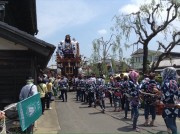
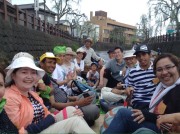
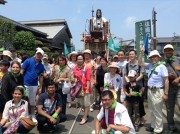
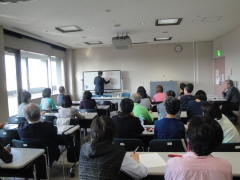
The Workshop to Improve Japanese language Skills for the Volunteer Teachers
Japanese Language Committee held the workshop to improve the teaching skills for
the 25 volunteer Japanese language teachers at Lifelong Learning Center in
Ichikawa City on Oct 25.
The instructor, Mr. Hirohiko Matsuoka (The International Japanese Language
Diffusion Association) pointed out that the typical questions by foreign learners
include hidden aspects which native speakers ought to be awaked. Those queries
stem not only from grammatical difficulties but from their misunderstandings in
cultural and custom difference.
lectured about �gincomprehensive point in Japanese language for the foreign learners,�h include foreigners�f misunderstandings stem from the cultural and custom difference.
Mention some examples of misunderstandings.
��Greetings. �gAre you going somewhere?�h
Question. �gWhy do Japanese such a question every time you meet?�h
Answer. It�fs not making a query about the destination but only a casual hail.
��Misunderstanding. �gWrite essay about the unforgettable teacher.�h
There were a lot of compositions in negative way. But in Japan, the term
�gunforgettable�h is often used in positive meaning such as �grespectful.�h
The above is a few example of foreign learners�f typical misunderstandings.
We, volunteer Japanese language teachers, should keep in our mind Mr.Matsuoka�fs
deep regrets when he hurt foreigners without consideration for the differences in
background of non-Japanese and Japanese.
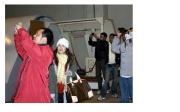
There were the old cityscape where old architectures of Edo era were moved and we enjoyed to experience many things.
We took the good lunch there since it was so nice day and go toward the Museum of Aeronautical Sciences. We also enjoyed to watch airplanes closely, landing on and off frequently, from the 5th story of its building. In the bus returning to Ichikawa, we enjoyed to play BINGO game and returned to Gyotoku Branch and the City Hall on time.
Volunteers, thank you very much for your big support.
The committee helps foreigners to learn Japanese language so that they can live more comfortably in Japan. We believe their Japanese life will be more valuable through studying the language, Japanese culture and customs.
There are 17 Japanese language classes and each class is developed and coordinated by 120 volunteers and features their own special creativity to assist learning the language.
Main activities�F
1) Opening Japanese language classes in many places in Ichikawa
| Japanese Language Class List | |
| Gyotoku Area | Ichikawa Aea |
| English Spanish Japanese Chinese |
English Spanish Japanese Chinese |
| All classes are being closed now due to COVID-19. Please wait until it calms down. | |
Please check with the coordinator the place, time schedule and tuition before you join since they may be changed.
2) Arranging classes on how to teach the Japanese language
We periodically coordinate Japanese language teaching lectures.
3) Holding Japanese language training session
Japanese training sessions coached by professionals are held for the volunteer teachers several times a year These sessions are to improve quality and skills of teaching and they learn how to teach unique expressions in Japanese.
4) Support for the Survival Japanese Class
Survival Japanese is coordinated mainly by the Foreign Resident Committee with our full cooperation.
Profile of the Japanese language class students

Mr. D.D. An employee of an electronic communication company for four years. Came from Philippine.
I love Japan, above all, Ichikawa is comfortable place to live for foreigners. I graduated from the Japanese language class for the beginners last October. On the commencement ceremony, I made a speech in fluent Japanese as follows: �gWhen I�fve been to onsen, hot spring, for the first time, I was surprised that everybody dipped in the hot spring with fully naked. But as I got accustomed to that, I�fve turned out to be an onsen lover, because when you�fre in onsen, people are all equal regardless rich or poor.�h
Ms. S.K. A housewife, came from India two years before.
The impression of Japanese �F peoples�f honest and punctual behavior.She said she has past the exam of JLPT grade 4 recently. She is dreaming of passing N1 in the future. She sang �gUE WO MUITE ARUKOU�h with beautiful soprano voice at the class�fs new year party and got great applause from the classmates.
[ footnote: What is JLPT? For the people who don�ft speak Japanese language as a mother tongue in Japan and elsewhere, JLPT conduct the exams for the purpose of measuring and accrediting in Japanese Language ability. This organization has administrated by International Exchange Fund and Japan International Education Assistance
Previous Events


Upskilling of Volunteer Japanese Language Class instructors �@
Japanese Language Committee organized the workshop to improve the teaching skills of 28 volunteer Japanese language teachers, held at Gyotoku Kominkan on July 23, 2018.The following are the main points considered for this course : �@ The theme centers on how to use well the recent teaching materials. �ATo open one same course in Ichikawa and Gyotoku. �BTo invite the instructor from AJALT(Association for Japanese-Language Teaching) �C The course fee is free.
This course is well accepted and evaluated highly by the attendees.
�B


Bus tour to Naritasan Shinsyoji Temple & Boso- no- mura
It was Indian summer on November 12, 2016.We tripped to Naritasan & Boso-no-mura with 41 foreigners and 4 stuffs by bus.
Fortunately, Naritasan was in full autumnal tints and chrysanthemum holding and we had valuable experience of a Goma Fire Ritual.
Boso-no-mura is a Chiba prefectural facility that reproduces a Japanese scenery of Edo era which were old samurai residences and farmhouses.
We enjoyed first-hand various types of Japanese traditional crafts such as Takeuma(stilts) and Koma(spinning top).

The Survival Japanese Language Class in Ichikawa 2016
The10th Survival Japanese Language Class was held at the lunch room in the 7th municipal junior high school during August 23 to 24, under the auspice of IIA.40 students were participated -- 32 elementary school ,8 junior high -- from 10 foreign countries, include China, Taiwan, Philippine and so forth. Some of those 13 students have been newly arrived in Japan and supposed to enter Japanese school. And they have joined after finishing the Japanese language supporting program for the preschoolers. This program has started last year and delegated to the Japanese Language Class Committee from the Municipal Board of Education.
The participants have studied a lot of things such as learning how to read Japanese calendar and clock, exploring the school facilities, making timetables etc. And they would have felt the atmosphere of Japans�f school life throughout those workouts prior to a school term begins.
On the curriculum in �gGet to know more about Ichikawa City�h, they checked where their homes and the schools were. Then, they played a game of sugoroku in which they looked around the great sights in the City, and spent recess time playing karuta ? Japanese card ? on which they could see many pictures of the beautiful Ichikawa�fs scenery.
On the 24, they made a field trip riding two buses. The first visit was the confectionery plant that produce kasutera ?sponge cake ? and they tried taste testing them. The next visit was The City�f s Western Part Disaster Prevention Center. They had already accustomed to disaster preventive knowledge and how to deal with in case of emergency, because they had learned about those issues at the classes held in the previous day. Their parents also pleased to have practice for disaster prevention with their children.

Stroll around Imperial Palace and Parliament House.
�gKONNICHWA�h, a group of Japanese language class had made one-day tour to Imperial Palace and parliament house on November 26, 2026. All together 44 members, include the class�fs students, their family members and some volunteer members were participated in the tour.They took a walk to koukyo higashi gyoen, the Eastern Garden in the Palace, and took a photo on the back of nijyuu-bashi, a bridge entrance to the Palace. After having their B.Y.O lunch, they strolled through the parliament house. A line of the participants along the road stretched so long because of everyone�fs walking pace had been different, that made capable guides difficulty with bringing them together.
At the end, they had a valuable one-hour guided tour at the parliament�fs conference hall.

Saturday Class for International School Kids
This class is for children with age ranging from one year before elementary school to junior highs, who have backgrounds related to foreign countries. The class is held on first and third Saturdays from 10 to 12 in the mornings at Niihama Primary School.Most of the students are less than one year since coming to Japan, with nationalities ranging from Chinese, Philippine, Vietnamese, Indonesian, Peruvian, Guatemalan, Kyrgyz, Thai, to Nepali; 20 elementary school students and 5 junior highs.
Class�fs Objectives:
- Help kids adapt themselves to Japanese school life, provide place for relax and enjoy
- Help kids take pride in their (parent�fs) country and culture
- Support them in cooperation with their parents
- Help kids actively join the local community, and learn to live self-reliantly their own life
In this class we teach Japanese with emphases firstly on listing, secondly on speaking, and thirdly on writing abilities. We help students to build vocabulary necessary in school through enjoyable learning methods utilizing the real objects, picture cards, games, and songs.
At the end of every class periods we have students-parents parties/activities; international potlach Yukata party in July, gift exchange at the year-end party in December, completion ceremony and parents meeting in March. Also, we actively participate in local/IIA�fs activities such as �gSurvival Japanese Course�h and �gNew Year Festival�h.
In April new class period has started, new students have enrolled.
Volunteers who would like to help children learn Japanese are welcome. Those who have interests are encouraged to contact us.

Two Weeks With Japanese Language Students From Thailand
Four girl students from Thailand with ages ranging from 14 to 17 stayed at Showa Gakuin from April 18 to May 2, leaned various aspects of Japan.Programs consist of Japanese language lessons in the mornings and cultural activities in the afternoons; such as visits to Akihabara, Imperial Palace, Tokyo Disney Resort, and experiences of Calligraphy and Origami.
Although Thai students had different levels of Japanese language skill, they all enjoyed interactions with students at Showa Gakuin, actively participated in the program.
Two volunteer teachers at UNESCO Ichikawa School actively contributed to the Japanese language study programs from planning through implementation.
Interesting episodes we found in our communications with Thai students include; they named Ramen and curry rice as their favorite foods, and breads are called as Yamazaki in Bangkok.
It was truly enjoyable two weeks, and we believe that Thai students must have come to feel intimacy to Japan and become fans of Japan through this program.



Bus Tour for Sankei-en and China town in Yokohama�@
(Co-hosted by Cross Cultural Exch. Committee)
We tripped to Yokohama area with 38 foreigners and 9 volunteers by bus though it
was raining on November 15, 2015. It, however, cleared sky when we arrived at
Sankei-en and enjoyed seeing the huge beautiful Japanese garden and historical
architectures collected from Kyoto and Kamakura. We then went to China Town
where the food festival was held and so crowded. After enjoying shopping and
eating, we went to Yamashita Park. After enjoying bay circumstance, we were in
the bus going back to Ichikawa while enjoying a bingo game and quiz of
mathematics. 


Bus Tour for Sawara (Co-hosted by Cross Cultural Exch. Committee)
The destination is Katori City, being called Koedo (Small Edo: old name of Tokyo). This area has prospered as water transportation system made by Tone River. We enjoyed Japanese summer festival I have seen first time, drawing the decorated floats, joining the folk dance and pounding mochi which was off season. We appreciate Katori International Association supporting us very much.
The Workshop to Improve Japanese language Skills for the Volunteer Teachers
Japanese Language Committee held the workshop to improve the teaching skills for the 25 volunteer Japanese language teachers at Lifelong Learning Center in
Ichikawa City on Oct 25.
The instructor, Mr. Hirohiko Matsuoka (The International Japanese Language
Diffusion Association) pointed out that the typical questions by foreign learners
include hidden aspects which native speakers ought to be awaked. Those queries
stem not only from grammatical difficulties but from their misunderstandings in
cultural and custom difference.
lectured about �gincomprehensive point in Japanese language for the foreign learners,�h include foreigners�f misunderstandings stem from the cultural and custom difference.
Mention some examples of misunderstandings.
��Greetings. �gAre you going somewhere?�h
Question. �gWhy do Japanese such a question every time you meet?�h
Answer. It�fs not making a query about the destination but only a casual hail.
��Misunderstanding. �gWrite essay about the unforgettable teacher.�h
There were a lot of compositions in negative way. But in Japan, the term
�gunforgettable�h is often used in positive meaning such as �grespectful.�h
The above is a few example of foreign learners�f typical misunderstandings.
We, volunteer Japanese language teachers, should keep in our mind Mr.Matsuoka�fs
deep regrets when he hurt foreigners without consideration for the differences in
background of non-Japanese and Japanese.

Bus Tour
The destinations were Bousou no mura(Village in Chiba) in Narita and Museum of Aeronautical Sciences. The attendees were Chinese, Indian, Malaysian, Filipino, Nepalese, Myanmar and German. We are sorry to decline their participation since applicants were more than limited.There were the old cityscape where old architectures of Edo era were moved and we enjoyed to experience many things.
We took the good lunch there since it was so nice day and go toward the Museum of Aeronautical Sciences. We also enjoyed to watch airplanes closely, landing on and off frequently, from the 5th story of its building. In the bus returning to Ichikawa, we enjoyed to play BINGO game and returned to Gyotoku Branch and the City Hall on time.
Volunteers, thank you very much for your big support.
Ichikawa Int'l Exchange Assoc. (IIA)�s��s���ی𗬋���
��272-0021
3rd Floor, 2-4-8 Yawata, Ichikawa, Chiba, Japan
Phone �@+81-(0)47-332-0100
FAX �@ +81-(0)47-332-0101
email �@info@iia21.jp
Lounge Hour�@10:00-16:00�@
Closed: Thursdays, Sundays and National Holidays